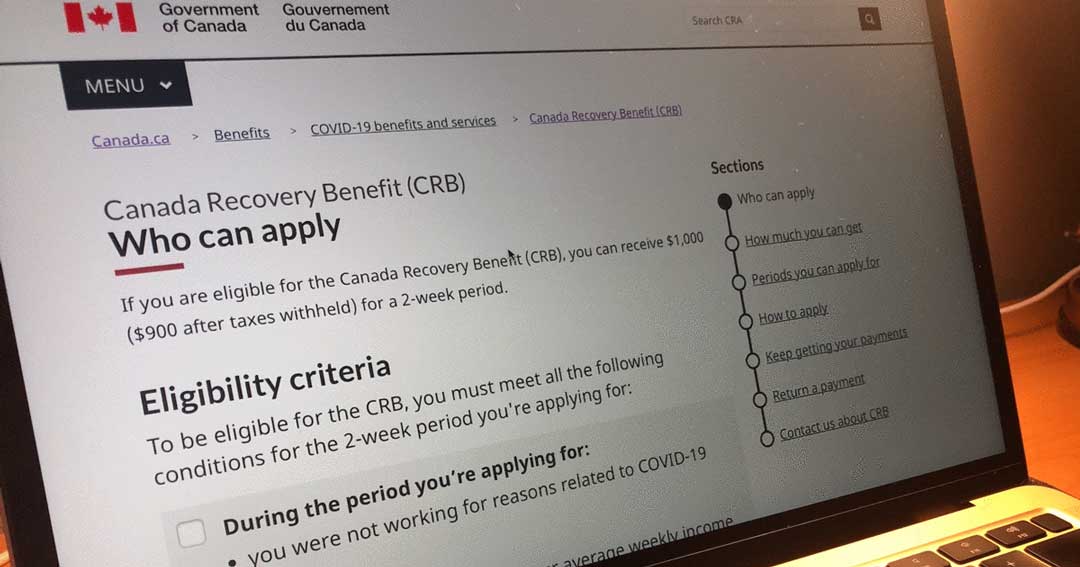
The Canada Revenue Agency (CRA) launched the Canada Emergency Response Benefit (CERB) as the flagship COVID-19 program by the Canadian government in 2020. CERB became a lifeline for Canadians who lost income due to the pandemic. The program ended on September 27, 2020, and made way for CERB replacements.
The federal government revamped the Employment Insurance (EI) system and introduced the Canada Recovery Benefit (CRB) to transition Canadians still in need of financial aid. With no visible end to the pandemic, despite hopeful developments on the vaccine front, the government announced two major updates for EI and CRB.
Maximum duration
Many CRB recipients are due to exhaust their benefits on March 27, 2021. The government’s announcement to update CRB and EI came right on time. One of the changes introduced by the CRA will be an extension of CRB from the original 26 weeks to 38 weeks. For regular EI benefits, the CRA has extended the period to 50 weeks for claims made between September 27, 2020, and September 25, 2021.
The federal government also extended the Canada Recovery Caregiving Benefit (CRCB) and Canada Recovery Sick Benefit (CRSB). The CRCB duration is also 36 weeks after the update, while the CRSB has been extended from two to four weeks.
CRA cash benefit amount
The CRA pays $1,000 for each two-week CRB eligibility period, which is actually $900 after the 10% withholding tax is deducted at the source. For self-employed individuals who prefer access to their EI benefits through Service Canada, the government has reduced the self-employed income threshold (for 2020 earnings) from $7,555 to $5,000.
You can earn income while you receive CRB, provided that your annual income for the calendar year will not go over $38,000. You will need to pay 50% of each dollar of your income that goes above $38,000.
If you qualify for the EI benefit, the minimum amount you can receive per week is $500 (subject to a 10% tax on payment), but some people may be eligible to receive up to $573 per week, depending on their previous income. The proceeds for both CRSB and CRCB are $450 per week (subject to a 10% withholding tax upon payment).
Source: CRA
Newsletters
Newsletter – March 2019
NewslettersEvents & SponsorshipArticles & Publications
Newsletter – February 2019
NewslettersEvents & SponsorshipArticles & Publications
Newsletter December 2018
NewslettersEvents & SponsorshipArticles & Publications
Newsletter November 2018
NewslettersEvents & SponsorshipArticles & Publications
e-Newsletter – August 2018
NewslettersEvents & SponsorshipArticles & Publications
Events & Sponsorship
No Results Found
The page you requested could not be found. Try refining your search, or use the navigation above to locate the post.
Articles & Publications
RRSP/RRIF and non-registered investments
Drawing from your RRSP/RRIF and non-registered investments. It often helps to think in terms of family wealth and tax efficiency. One of the most asked questions the newly retired or those about to retire have is: "When should I start drawing from my registered...
Strategies to consider when buying a second property
Strategies to consider when buying a second property. There are three common types of second properties people are looking at when they wish to buy a second property: cottages, income properties and U.S. real estate. COTTAGE PROPERTIES If you've been looking to buy a...
Incorporating your Business in Canada
Tax Advantages of Incorporating your Business in Canada Incorporating your business may lead to lower taxes depending on your particular situation and the province in which you operate. Incorporating can save you money once the business generates more income than you...
How much is child benefit in Canada per month?
How much is child benefit in Canada per month? For each child: under six years of age: $6,833 per year ($569.41 per month) 6 to 17 years of age: $5,765 per year ($480.41 per month). Will child benefit increase in 2021? On July 20, the Minister of Families, Children...
Is Cryptocurrency Taxable in Canada?
Is cryptocurrency taxable in Canada? According to CRA, possessing or holding a cryptocurrency is not taxable. However, selling, making a gift, trading or exchanging a cryptocurrency, including disposing of one to get another, or converting cryptocurrency to a...